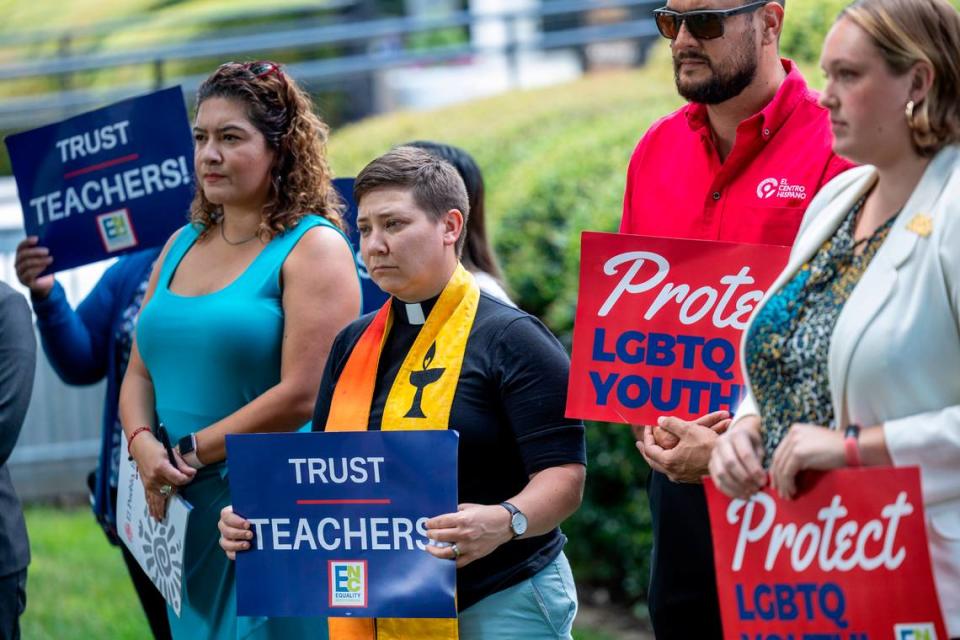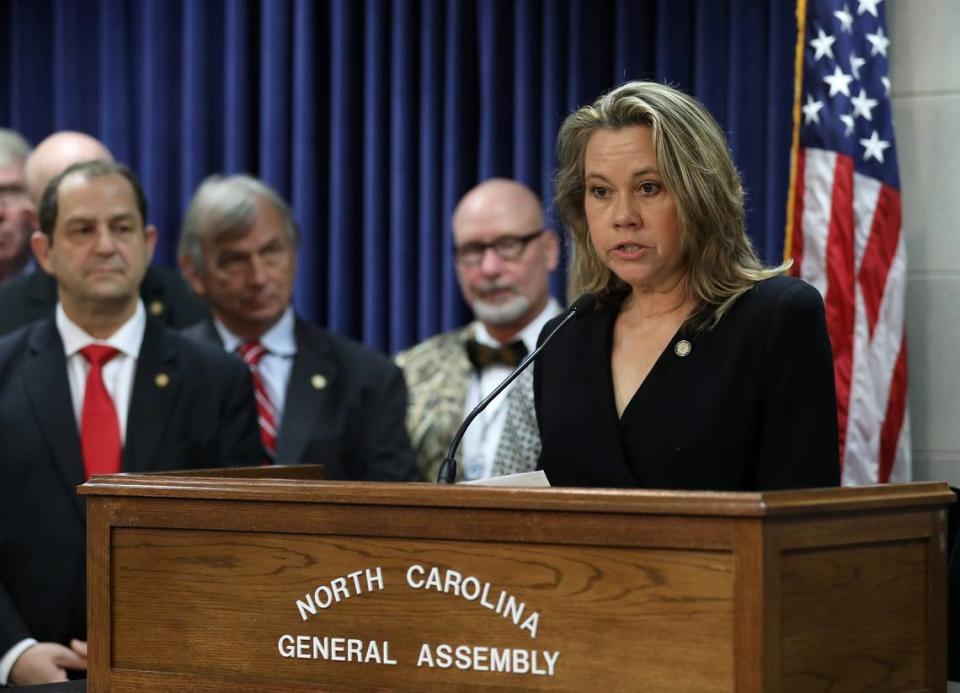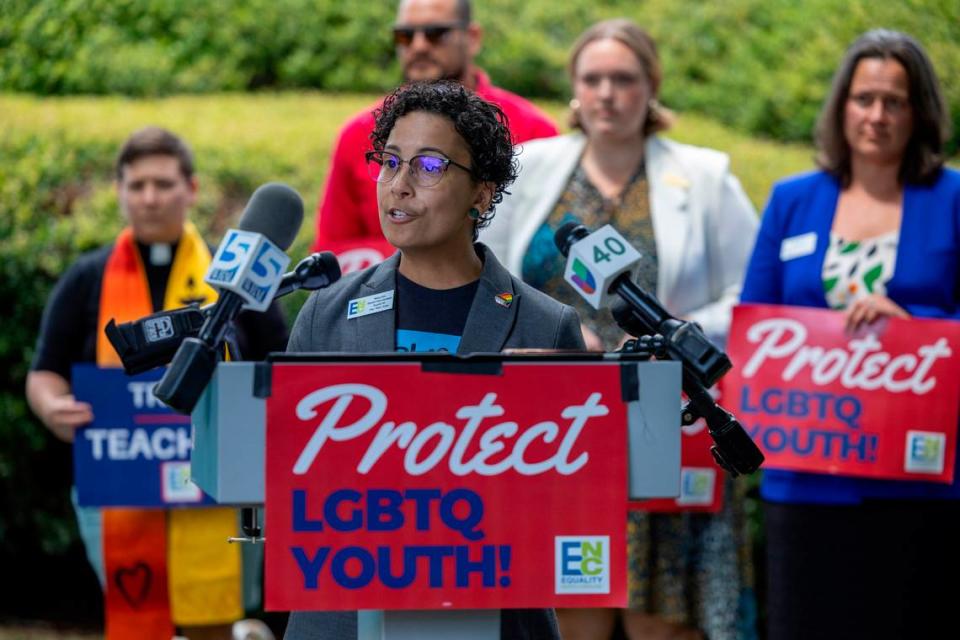NC schools must now follow ‘Parents’ Bill of Rights.’ Here’s how things could change.
North Carolina’s new “Parents’ Bill of Rights” could lead to immediate changes when classes start next week, including how schools deal with topics such as gender identity and pronoun usage.
The legislation, which became law last week after Republican lawmakers overrode Democratic Gov. Roy Cooper’s veto, now requires schools to notify parents if their child wants to use a different name or pronoun.
Some books may no longer be used by teachers to avoid the law’s new ban on “instruction in gender identity, sexual activity and sexuality” in the curriculum in kindergarten through fourth-grade classrooms.
“It will intimidate some educators because their intention was to bully teachers so we’d fear reprisal,” Jasmine Barcelona, a Wake County elementary school literacy coach, said in an interview. “They want this to be in the law so that teachers will be afraid to stand up for students who may be LGBTQ.”

Groups that fought for the new law, like the N.C. Values Coalition, say they will monitor whether schools comply with the requirements. If not, parents can file grievances and sue if they feel their rights have been violated under the new law.
“Parents have the right to expect the school to comply with the law,” Tami Fitzgerald, executive director of the N.C. Values Coalition, said in an interview. “If school employees like literacy coaches and teachers won’t comply with the law, you’re going to see some lawsuits filed by parents.”
Contacting parents about pronoun changes
The notification requirement for name and pronoun change is meant to help parents find out if their children are questioning their gender. Sen. Amy Galey, an Alamance County Republican, said withholding that information from parents would be a ”conspiracy to hide an essential truth about the mental health of their child.”

“To establish a policy in public schools that parents will not be notified if a child changes their name in school records or the name by which the student is called by school personnel is to establish a system based on lies to parents,” Galey said during the override vote.
Opponents of the law say it could lead to LGBTQ students being outed to parents who won’t accept them.
“It should just be up to any queer or trans person when to come out to their family, not the government or their school,” Emma Chinn, communications and policy manager for the Campaign for Southern Equality, said in an interview.
Broad notification requirements
The law is written so broadly that Kim Mackey, a social studies teacher at Green Hope High School in Cary, says it will apply any time a student wants to use a different name, such as a nickname. Mackey estimates that 30% of her students use a different name than what’s on school records.
“A lot of parents are going to get a lot of notifications from multiple teachers so teachers aren’t putting themselves at risk of breaking the law by calling Allison ‘Allie’ without letting their parents know,” Mackey said in an interview.
Mackey calls the law an example of “gotcha games from people who don’t understand what it feels like to be in the classroom to get the most of our their students.”
The new notification requirements may also cause students to stop confiding in teachers and other school employees, Mackey said.
“What we’ve done now is make students less likely to turn to trusted adults, which means they’ll turn to each other more, which I don’t think is helpful for students who are struggling with their mental health,” Mackey said.
Will schools remove LGBTQ books?
The law doesn’t define what “gender identity,” sexual activity” or “sexuality” is when it says it can’t be part of the K-4 curriculum. But Fitzgerald said she expects books such as “Melissa” by Alex Gino to no longer be used in elementary schools. She said the law will “hopefully get rogue teachers under wraps.”

“Melissa” is the story of a 10-year-old transgender girl who struggles to come out to her family, friends and classmates, The News & Observer previously reported. But the book, which used to go by the title “George,” is an example of what Fitzgerald calls an attempt by schools to indoctrinate students about gender identity.
“We expect that obscene books will not be used in the classroom as a result of the Parents’ Bill of Rights,” Fitzgerald said. “That’s what parents are demanding.”
The new law could also cause K-4 teachers to stop using books for diversity lessons that include LGBTQ families, according to Rebby Kern, director of education policy at Equality NC. Kern is also worried that the bill could cause teachers in upper grades to make changes.
“This bill is working a lot of fear,” Kern said in an interview. “Educators are going to be fearful. Even if they are educators in grades five and up, they may rethink some of their equity lessons simply because of the rhetoric the bill has inspired.”

Barcelona, the literacy coach, said she’d still encourage teachers to use books that reflect the diversity of their school community.
“I know we touch on marginalized communities that have struggles,” Barcelona said. “Because of the attention on the LGBTQ community, those lessons are going to be more interesting in the classroom.”
Schools reviewing the new law
Some school districts, such as Chapel Hill-Carrboro, have spoken out against the Parents’ Bill of Rights, as well as another new law that restricts gender-affirming care for minors.
“Like many others across North Carolina, our hearts break for the students and families who will be harmed by this legislation,” Rani Dasi, chair of the Chapel Hill-Carrboro school board, said in a statement at Thursday’s school board meeting. “The CHCCS Board unequivocally affirms LGBTQ+ students and staff in our community.
“We will work toward maintaining spaces that are safe and nurturing so that every student, family and staff member feels seen, valued and supported in Chapel Hill-Carrboro City Schools.”
Andy Jenks, a Chapel Hill-Carrboro spokesperson, said the district doesn’t see immediate changes forthcoming in its classrooms and libraries. But Jenks said the district will be reviewing the new law, which will include consulting with legal counsel and neighboring school districts.
Wake County is also reviewing the new law to determine how to implement it, according to Lisa Luten, a district spokesperson. Luten said Wake is consulting with the state’s education attorneys and the state Department of Public Instruction.
School districts are also waiting for guidance from the N.C. School Boards Association.
On Tuesday, 800 Wake County school system counseling and student services staff members met at Apex Friendship High School to talk about how to support the mental health needs of students. Marrius Pettiford, senior director for Counseling and Student Services, said they’re still trying to determine how the law will impact what they do this school year.
“There certainly will be an impact,” Pettiford said in an interview. “We just don’t know yet what level.”
Florida’s ‘Don’t Say Gay’ law
North Carolina’s new law has been compared to what was originally adopted in Florida, which critics dubbed a “Don’t Say Gay” law. The original Florida law dictated that “classroom instruction by school personnel or third parties on sexual orientation or gender identity may not occur in kindergarten through grade 3.”
The Florida Board of Education approved extending the law’s ban to all grades in April. The original law was expanded, through other legislation, in May, to include pre-K and fourth through eighth grades.
“The biggest impact, I would have to say, was the book banning,” Andrew Spar, president of the Florida Education Association, the largest teacher union in the state, said in an interview. “These laws were used to remove books that talked about families who are part of the LGBTQ community.”
Michael Woods, a high school teacher in Florida’s Palm Beach County, said Florida’s law is having a “chilling effect” on teachers.
In May, a Florida teacher resigned after she was investigated for showing her students a PG-rated Disney movie that featured a gay character whose sexuality was mentioned once at the beginning of the movie.
“I would predict the Carolinas are going to expand it just like we did,” Woods said in an interview. “The law probably is scary, but what is going to happen with your department of education policy is perhaps probably the scariest part of it.”

Could NC expand the law?
Fitzgerald said she’d like North Carolina to take additional steps such as removing obscenity exemptions from schools and libraries.
In July, an extensive bill was quickly introduced and then removed from consideration that would expand the prohibition on instruction on gender identity, sexual activity and sexuality to the fifth grade.
The bill would have also have made librarians and school personnel subject to prosecution if they didn’t keep “material harmful to minors” only in an age-restricted section of schools and libraries.
House Speaker Tim Moore says the bill likely won’t be acted on this session. But Chinn of the Campaign for Southern Equality said the fact that the bill was drafted shows that’s what GOP lawmakers have on their minds.
“It’s this slippery slope where really established curriculum becomes taken out of school because of these policies,” Chinn said. “It’s frightening to see this passed because of what we’ve seen in other states. ”

